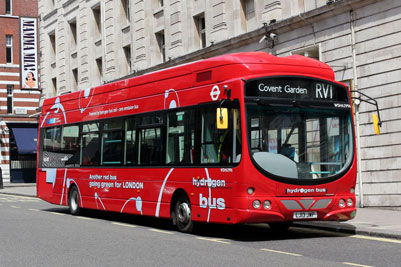Mayor’s drive to improve air quality continues as London completes the world’s largest bus retrofit programme
- Like
- Digg
- Del
- Tumblr
- VKontakte
- Buffer
- Love This
- Odnoklassniki
- Meneame
- Blogger
- Amazon
- Yahoo Mail
- Gmail
- AOL
- Newsvine
- HackerNews
- Evernote
- MySpace
- Mail.ru
- Viadeo
- Line
- Comments
- Yummly
- SMS
- Viber
- Telegram
- Subscribe
- Skype
- Facebook Messenger
- Kakao
- LiveJournal
- Yammer
- Edgar
- Fintel
- Mix
- Instapaper
- Copy Link
Posted: 21 July 2014 | Transport for London | No comments yet
The Mayor and Transport for London have successfully completed the world’s largest retrofit programme of over 1,000 older buses…


The Mayor and Transport for London (TfL) have successfully completed the world’s largest retrofit programme of over 1,000 older buses, part of a comprehensive programme of measures to deliver significant reductions in harmful NOx emissions and improve air quality for Londoners and visitors to the capital.


The retrofit programme has led to significant improvements in emissions throughout London (Image: TfL)
Innovative pollution reducing equipment has now been installed on the exhaust systems of 1,015 buses operating on more than 50 routes across London, and the Mayor and TfL are now exploring plans to expand the programme with the Department for Transport (DfT).
Priority was given to bus routes passing through areas with high nitrogen dioxide concentrations including those serving Elephant and Castle, Marylebone Road, Fulham Broadway, Oxford Street and Putney High Street. The £10m retrofit programme funded by TfL and the DfT has already delivered air quality benefits to 102 of the 187 nitrogen dioxide focus areas identified by the Mayor in the capital.
The retrofit process involves fitting a Selective Catalytic Reduction (SCR) system to the exhaust of each bus. The equipment was successfully trialled in 2012, demonstrating NOx emission reductions of up to 88 per cent. A recent report commissioned by Wandsworth Council and published by King’s College London shows that the programme is already having an impact; since the new technology was fitted there has been a major reduction in the number of times nitrogen dioxide levels exceeded the EU hourly target on Putney High Street.
Combined with the roll out of new hybrid buses (including the New Routemaster) and the early introduction of new Euro 6 buses, the retrofit programme has led to significant improvements in emissions throughout London. In the last two years, NOx emissions from buses along Oxford Street have fallen by 33 per cent.
Matthew Pencharz, the Mayor’s Senior Advisor for Environment and Energy, said: “Part of the most ambitious and comprehensive programme of measures being driven by the Mayor to reduce emissions and improve London’s air quality, this ground-breaking retrofit programme is making a big impact across the city. Greening the capital’s bus fleet is one of the Mayor’s top priorities. As well as completing the retrofit of over 1,000 older buses with this pollution busting equipment, we continue to expand the city’s fleet of hybrid buses – which includes the roll out of the New Routemasters – and are also trialling the use of electricity, hydrogen and bio-diesel to power the capital’s fleet.
“From green walls and promoting cycling, to reducing freight activity and retiring the oldest and most polluting buses and taxis, the Mayor’s programmes are reducing the emission of major pollutants in London. As London gears up for the world’s first Ultra Low Emission Zone from 2020 this positive trend is set to continue.”
Mike Weston, TfL’s Director of Buses, said: “Fitting this innovative equipment to the older buses in our fleet is making a significant contribution to improving London’s air quality and complements the other measures we are taking to improve the environmental performance of our 8,700-strong bus fleet. Retro-fitting buses with SCR equipment is the quickest and most cost-effective way to cut NOx emissions from the exhaust systems of older buses and the recent results from Putney High Street show it’s having a significant impact.”
The Mayor has made it a top priority to reduce the environmental impact of London’s bus fleet. The capital already has the largest hybrid bus fleet in Europe with over 850 hybrid buses currently in service. In 2016 there will be 1,700 hybrid buses on London’s roads – of which 600 will be New Routemasters – representing 20 per cent of the bus fleet.
All buses already achieve Euro IV standard for particulate matter (PM) and, as a result, emissions of particulate matter from the fleet have dropped from over 200 tonnes in 1997 to 20 tonnes in 2014. The remaining Euro 3 buses will be fitted with SCR equipment or replaced with new cleaner Euro VI vehicles, which means that all of TfL’s bus fleet will be Euro IV standard or better for NOx emissions by the end of 2015. This will reduce emissions by at least 800 tonnes each year.
The New Routemaster is already the greenest bus of its class in the world and is set to get even greener with the introduction of the very latest Euro VI engines. Four New Routemasters with a Euro VI engine are currently being tested in passenger service with the wider introduction starting later this year.
Related cities
London, United Kingdom
Related organisations
Department for Transport (DfT), Transport for London (TfL)
Related people
Boris Johnson, Matthew Pencharz, Mike Weston



